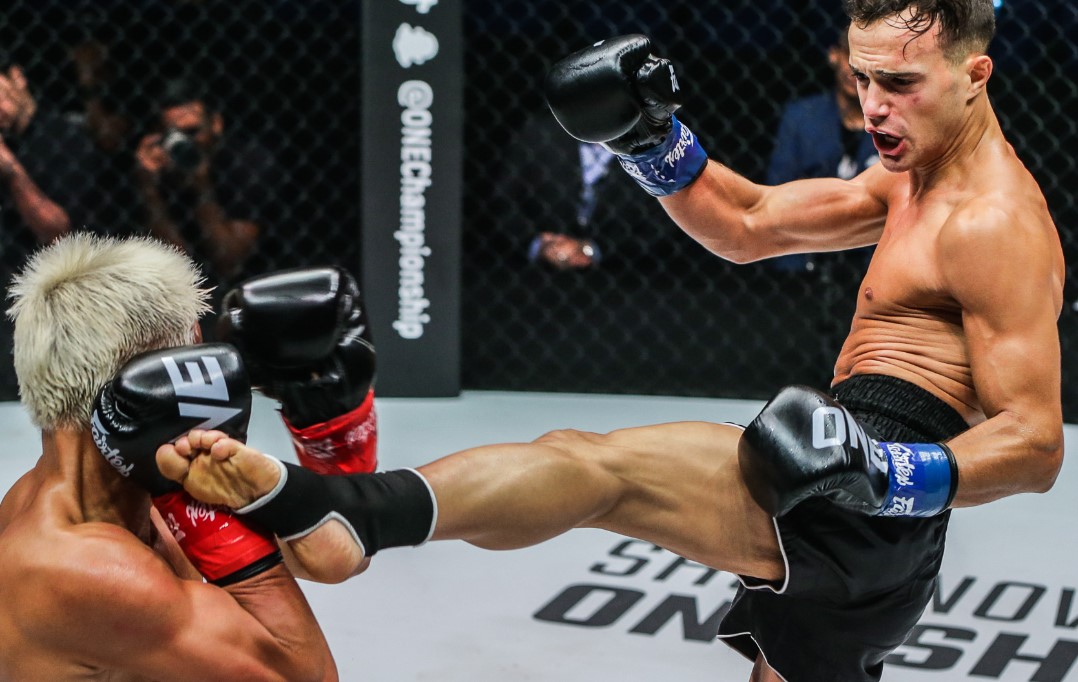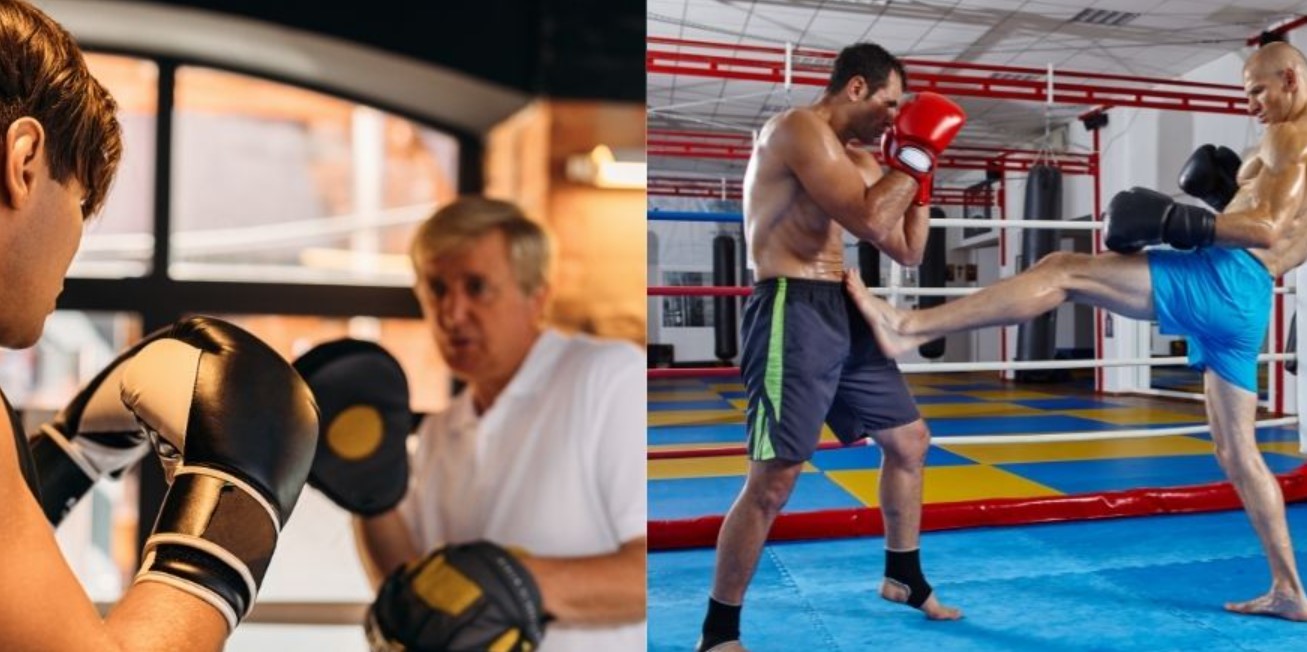Which is better for self defense boxing or kickboxing? When it comes to self-defense training, the two most well-known combat sports are probably boxing and kickboxing. Both boxing and kickboxing are famous martial arts celebrated for their effectiveness in real-life combat situations. But when it comes to deciding which is more suitable for self-defense, the debate is more heated.
Join Theselfdefensetool.com in delving into the intricacies of boxing and kickboxing to determine which has the upper hand., learn aboutStrengths and weaknesses of each person to determine who is the self-defense champion.
The boxer’s playground: The advantages of boxing

Boxing, often hailed as the “sweet science”, is a discipline that primarily focuses on punching technique. It emphasizes footwork, head movement, and tight defense to effectively dodge and counter your opponent’s attacks. Fighters are trained to strike with precision, speed and power, targeting their opponents’ heads and bodies with jabs, crosses, hooks and uppercuts.
- Simplicity: Boxing techniques are relatively simple to learn and perform under stress, making it suitable for people of all ages and fitness levels.
- Close-Range Combat: Boxing excels at close-range combat, where fast and precise punches can knock down an attacker quickly.
- Defense skills: Fighters develop special defensive skills, including swinging, weaving, and parrying, which help them effectively dodge incoming attacks.
- Mental toughness: Boxing training builds mental toughness and resilience, preparing individuals to stay calm and focused in confrontational situations.
- Outstanding punching technique: Boxing boasts the most refined punching mechanics in martial arts. Years of training in footwork, head movement, and power generation skills make a fighter’s strikes extremely precise and devastating.
- The dexterity of footwork: Footwork in boxing is a master class in balance, agility and maintaining distance. This allows the boxer to control the fight, avoid attacks and close the distance for powerful punches.
- Develop an iron chin: Boxing training helps build incredible strength in your chin, allowing you to withstand a number of blows without being knocked out. This can be very important in a self-defense situation.
>>> Click Is Wrestling Or Jiu Jitsu Better For Self Defense?
The Kicker’s Arsenal: Kickboxing’s strengths
Kickboxing is a dynamic martial art that combines both punching and kicking techniques. It originated as a fusion of traditional karate and boxing, evolving into a distinct discipline characterized by its versatility and adaptability. Kickboxers use a combination of punches, kicks, knee strikes and elbow strikes to subdue their opponents, creating a formidable arsenal of offensive and defensive weapons.

- Technical scope: Kickboxing offers a wider variety of striking techniques than boxing, including kicks and knee strikes, allowing the practitioner to maintain distance and control against multiple attackers.
- Full body workoutn: Kickboxing provides a comprehensive full-body workout, increasing cardiovascular health, muscle strength and flexibility, thereby improving overall fitness.
- Flexibility in self-defense: Kickboxers are trained to counter a variety of attacks, combining both hand-to-hand combat and kicking techniques to effectively neutralize threats.
- React instinctively: Through repetitive practice, kickboxers develop muscle memory and reflexes, allowing them to react instinctively to unexpected threats and aggression.
- Variety of weapons: Kickboxing combines punches, kicks, knees and elbows. This varied range of attacks keeps attackers guessing and allows you to exploit openings with powerful kicks or close-range attacks.
- Long Range Domination: Kicks extend your combat range significantly. This allows you to maintain a safe distance, control the fight, and potentially end the encounter with a decisive foot strike.
- Effective anti-grappling: Many self-defense situations involve grappling efforts. Kickboxing focuses on strong knees and elbows which can be highly effective in countering takedowns and pinfalls.
Which is better for self defense boxing or kickboxing?
Is boxing or kickboxing better for self defense? While both are superior, choosing the better self-defense option depends on your personal needs and preferences:

- Previous experience: If you have previous boxing experience, transitioning to kickboxing may be easier. Conversely, a fresh start can benefit kickboxing’s broader skill set.
- Learning style: Boxing focuses on complex footwork and techniques that may appeal to detail-oriented individuals. Kickboxing’s dynamic attacks may suit those who prefer a more action-packed approach.
- Physical Properties: Taller people may benefit more from kickboxing’s long-range strikes. Stockier designs can surpass the close combat punching power of boxing.
- Technical scope: Kickboxing’s inclusion of kicks and knee strikes provides the practitioner with additional options for defense against an armed attacker or multiple attackers, making it more versatile in certain situations. However, boxing’s focus on punching technique can be equally effective in close combat situations where grappling or tie-ups may occur.
- Exercise intensity: Kickboxing sessions often include rigorous cardiovascular training and conditioning exercises, which can help individuals better prepare for lasting physical changes. Boxing, on the other hand, focuses on precise offensive and defensive movements to improve technical proficiency and mental strength, important factors in self-defense situations.
Ultimately, both boxing and kickboxing offer excellent self-defense. The “better” option depends on your circumstances and personal preferences. Here’s a quick cheat sheet to help you decide:
- Choose Boxing because: Superb punching technique, skillful footwork and iron chin development.
- Choose Kickboxing because: Diverse attack range, dominant at long range and effective against grappling.
No matter which path you choose, regular training in boxing or kickboxing will greatly enhance your self-defense abilities. Remember, the best defense is a good offense, and the confidence and awareness gained through martial arts training are invaluable assets in any situation.
Which is more dangerous boxing or kickboxing?
Both boxing and kickboxing are combat sports with inherent risks, but studies suggest boxing might be slightly more dangerous. Here’s why:
- Focus on punches: Boxing concentrates strikes on the head, making it more likely to incur repetitive head trauma, which can lead to long-term health issues.
- Defense: Kickboxing allows blocking kicks with legs, potentially offering some protection to the head compared to boxing’s reliance solely on arms for upper body defense.
However, the difference in danger level might be nuanced. Here are some additional points:
- Injury rates: Studies show similar overall injury rates in both sports, with kickboxing having slightly more minor injuries.
- Long-term effects: Boxing seems to have a higher risk of long-term brain injuries due to the concentrated head strikes.
Ultimately, both sports require proper training and safety measures to minimize risks.
>>> Click Which Is Better For Self-Defense Karate Or Kickboxing?





